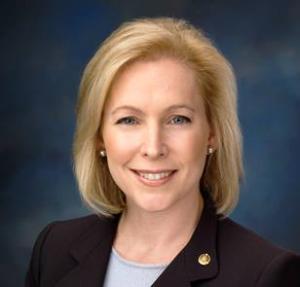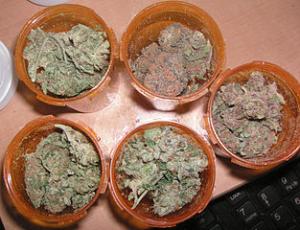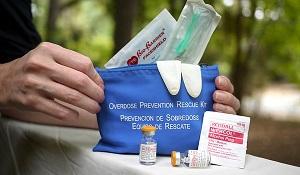A VA policy barring doctors from recommending -- or even discussing -- medical marijuana with their patients expires this weekend. Congresspersons, doctors, and patients are hoping a change for the better is coming.
Vermont takes a step toward becoming the first state to legalize marijuana through the legislative process.
New England is poised to be a marijuana reform hotbed this year, and it looks like Maine will have a chance to legalize it.
A new year, a new batch of drug war deaths.
No new qualifying conditions for Illinois, Puerto Rico adopts medical marijuana regulations, a New York state senator files a medical marijuana expansion bill, and more.
It's pretty quiet on the corrupt cops front this week. Maybe that's a good thing.
Pot policy is popping! A legalization bill advances in Vermont, a Maine initiative looks set to qualify for the ballot next week, a Virginia poll has a strong majority for legalization (somebody tell the legislature), and more.
Maine's legalization initiative looks like it will qualify for the ballot, Tommy Chong endorses Bernie Sanders, a new federal bill would fund needle exchanges, naloxone is in the news, and more.
A new report finds marijuana is a booming market, California doctors get on board with the AUMA legalization initiative, the White House wants nearly a billion bucks to fight opioid addiction -- with most of it going for "medication-assisted treatment" -- and more.
The idea of marijuana social clubs in the nation's capital remains alive, Rhode Island patients face the prospect of seeing their plants taxed, there are medical marijuana advances in Australia and Poland, and more.
What a difference a policy change makes! After decrim in Jamaica and actually enforcing decrim in New York City, marijuana arrests plummet in both places, a bill to cut marijuana penalties advances in Kansas, a bill to refelonize hard drug possession is in play in Maine, and more.
On Wednesday, a group of 21 US senators and representatives sent a letter to the Department of Veterans Affairs calling on it to allow VA doctors to discuss and recommend marijuana as medicine in states where it is legal.
The bipartisan effort was led by
Sens. Kirsten
Gillibrand (D-NY), Steve
Daines (R-MT), and Jeff
Merkley (D-OR) and Reps. Earl
Blumenauer (D-OR), Dina Titus (D-NV), and Dana
Rohrabacher (R-CA). All represent medical marijuana states.
Under current VA policy, embodied in VHA Directive 2011-004, which expires Sunday, VA doctors are prohibited recommending marijuana as a treatment option even in legal states. This discourages patients and doctors from being honest with each other.
"According to the current directive, VA providers are prohibited from completing forms seeking recommendations or opinions regarding a veteran's participation in a state-sanctioned marijuana program. This policy disincentivizes doctors and patients from being honest with each other," the solons wrote. "Congress has taken initial steps to alleviate this conflict in law and we will continue to work toward this goal. However, you are in a position to make this change when the current VHA directive expires at the end of this month. We ask that you act to ensure that our veterans' access to care is not compromised and that doctors and patients are allowed to have honest discussions about treatment options."
If patients can't get a recommendation from their VA docs and thus can't access dispensaries, they would be tempted to go elsewhere for recommendations, to doctors "likely far less familiar with their symptoms and medical history," the solons wrote.

Sen. Kirsten Gillibrand (D-NY) (senate.gov)
Noting that there has been a "sea change" in the legal framework around marijuana since the directive was issued in 2011, they asked that "upon the directive's expiration, any new directive remove barriers that would interfere with the doctor-patient relationship in states that have chosen to legalize marijuana for medical purposes."
But without a new directive, even though the old one is expiring, it will be the status quo at the VA, said Michael Krawitz, a US Air Force veteran and executive director of Veterans for Medical Cannabis Access. Krawitz participated in the process that led to the production and distribution of the directive.
"VA Directives remain in effect with full force even after expiration unless they are officially replaced or rescinded," he said. "Although I can understand that patients might not know that and might get uneasy about the expiring directive, but in practicality there should be no change in clinical practices caused by the expiration."
While VA patients could be spooked by the expiration, the status quo is unacceptable, said Dr. Sue Sisley, MD, in clinical psychiatry and internal medicine, who has two decades of experience treating veterans and who is set to do a pilot study on medical marijuana and PTSD for veterans.
"I've worked with veterans all over the country who are dealing with severe and chronic, debilitating medical problems," she said. "They just want the treatment that is going to help them the most, with the least side effects. I have seen firsthand the dramatic improvement so many veterans have had while taking cannabis. Not only have they experienced relief from problems such as PTSD, chronic pain, and migraines, but many of them have also been able to break their addiction to more dangerous drugs, such as opioids and benzodiazepines."

Vets can't get into dispensaries without recommendations. (wikimedia.org)
VA staff physician Deborah Gilman, MD, said current VA policy forces physicians to ignore the science if it conflicts with policy.
"Unlike private practice physicians, VA physicians are under a gag order regarding discussing marijuana with patients," she said. "In other settings, doctors can be honest about their medical opinions regarding treatment options, based on science. In the VA, an administrator can write policy that you can't disagree with without losing your job. Veterans are fearful of losing either their medical benefits or their access to health care if they acknowledge using marijuana. This causes a VA doctor to give you a medical opinion based on the VA regulation, not on the science. I knew many VA doctors whose professional opinion was that cannabis might help some of their patients, but they could never say so in their office or in public."
"There is nothing more sacred in healthcare than the doctor-patient relationship," said Sisley. "Right now we are seeing interference with that coveted relationship. No government policy should come between a doctor and their patients. The only people who should be making medical decisions for veterans are their physicians, not a bureaucrat and not a law enforcement official. These men and women have sacrificed so much for their country. It's only fair that they get the care that they deserve, and have access to the whole range of treatment options."
For Krawitz, it's about getting health care he and countless other vets deserve.
"I suffer from a combination of internal injuries and broken bones leading me to be a perfect candidate for cannabis as an adjunct pain treatment," he explained. "I need to be able to go in and see my VA doctor and have a honest conversation where my doctor feels free to gain knowledge now available through continuing medical education and relay that information to me in writing even if that is the very documentation is what I need to participate in a state medical marijuana program."
Now it's up to Veterans Affairs Secretary Robert McDonald. He's heard from Congress, he's heard from patients, he's heard from doctors and scientists. We'll see if he's listening.
back to top
A bill that would legalize marijuana and allow for regulated marijuana commerce is advancing. Senate Bill 137 passed out of the Senate Judiciary Committee on a 4-1 vote.
The bill allows for marijuana to be sold in stores, but bans home cultivation. Only licensed commercial grows in safe, secure locations will be allowed.
The Judiciary Committee vote to advance the measure came a day after six state physicians' groups came out against the bill, citing what they called the ill effects of marijuana.
The measure now goes to the Senate Finance Committee, Judiciary Committee Chair Richard Sears said. If the bill gets through the Senate, it is expected to face a tough battle to get through the House this year.
Peter Shumlin (D), who has endorsed the measure, pronounced himself pleased.
"I want to thank Senator Sears for his leadership and the entire Judiciary Committee for their hard work on this bill," he said in a statement.
"This legislation meets the principles I outlined in my State of the State Address and I believe it provides the framework for our state to cautiously, step-by-step and in the Vermont way end the failed war on drugs policy of marijuana prohibition. This debate is about whether we can take a smarter approach towards marijuana, which is already widely available and used by tens of thousands of Vermonters.Promoting prevention, keeping marijuana out of the hands of kids, getting rid of illegal drug dealers, and doing a better job responding to impaired drivers already on our roads, I believe this legislation is a huge improvement on the failed war on drugs," Shumlin continued. "I look forward to working with the legislature as they continue to debate this issue."
back to top
Mainers are likely be voting on legalization in November. Monday, the Campaign to Regulate Marijuana Like Alcohol turned in more than 103,000 raw signatures for its petition drive. It only needs 61,000 valid voter signatures to qualify for the November ballot.
As a general rule of thumb, initiative and referendum experts counsel petitioners to expect a certain percentage of raw signatures to be deemed invalid, but that figure is usually around 25% to 30%. For this petition drive to fail, more than 40% would have to be found invalid. It's not impossible, but it's unlikely."Over the past eight months, we've talked to more than 100,000 voters across the state, from Kittery to Caribou," said campaign manager David Boyer. "Most Mainers agree it is time to end the failed policy of marijuana prohibition, and they will have the opportunity to do it this November."
According to a poll last spring from the Portland marketing firm Critical Insights, a whopping two-thirds (65%) of Mainers support legalizing the weed, with nearly four out five (79%) saying it should be sold in licensed establishments.
The initiative would let people 21 or over possess up to 2.5 ounces of pot and grow a limited number of plants in their homes. It would also set up the framework for a tightly regulated system of licensed marijuana retail stores, cultivation facilities, product-manufacturing facilities, and testing facilities, and it would create rules governing the cultivation, testing, transportation, and sale of marijuana. The initiative would enact a 10% tax on marijuana sales.
"This initiative will replace the underground marijuana market with a tightly controlled system of legitimate, taxpaying businesses that create good jobs for Maine residents," Boyer said. "It will also make Maine safer by allowing enforcement officials to spend more time addressing serious crimes instead of enforcing failed marijuana prohibition laws."
Maine is ready to take marijuana "out of the shadows and out of the black market," state Rep. Diane Russell (D-Portland), a long-time legalization supporter, said at a Monday press conference. She scolded the legislature for refusing to act on legalization, but said the state's medical marijuana program pointed in the right direction. "It tells people we were right all along,"she said. "Maine people really do want a rational policy around drug use. Maine has proven we can regulate marijuana responsibly."
The push for legalization in Maine got off to a bumpy start, with two competing initiative campaigns, but activists were able to overcome acrimony and merge the two campaigns, leading to the united effort that appears to set the state down the path to legalization.
So far, only four states -- Alaska, Colorado, Oregon, and Washington -- all in the West, have voted to legalize it at the ballot box. Washington, DC, legalized possession and cultivation, but not sales and distribution. If the measure actually makes the ballot and passes, Maine could become the first state east of the Mississippi to legalize it.
But Vermont is moving toward legalization through the legislative process. That bill has won a first committee vote, but its prospects for passage this year are uncertain. And Massachusetts could well end voting for a legalization initiative this year, too. Whether it's Maine, Massachusetts, Vermont, or some combination of the above, New England is becoming a real hotbed for reefer reform this year.
back to top
At least three people were killed by American police enforcing the war on drugs last month, including one young man who died in a late-night drug raid that netted a little more than a quarter pound of marijuana.
Two of the dead were killed in night-time drug raids. Both were allegedly armed, although in neither case is it asserted that they fired on police. In both cases, police have not mentioned -- nor have local media asked -- whether these were kick-the-door-down, SWAT-style no-knock raids.
In a country where firearm ownership is both cherished and widespread, surprise police assaults that could be mistaken for home invasions can well result in homeowners grabbing their weapons to protect themselves and their domiciles. And then getting shot dead for doing so. Was that the case in these two deaths? We will likely never know. (The homeowners sometimes shoot and kill the invading police, too, but, unlike the police, they tend to get charged with murder.)
The third case raises a different kind of issue. Here, the victim was fleeing from police and made the all-too-familiar move "toward his waist band." He also had something in his hand, but it wasn't a weapon. And now he's dead, too. An unarmed man, running away from the police, is killed they were so quick to fear for their own lives.
Here are January's drug war deaths:
- On January 4, deputies in Louisiana's Beauregard Parish doing a night-time drug raid shot and killed Eric John Senegal, 27. They also shot and killed a dog at the house. The house was under investigation for drug activity and the deputies were serving a narcotics search warrant, according to State Police Troop D spokesman Sgt. James Anderson. Sheriff Ricky Moses later explained that the deputies "encountered an armed suspect who has been identified as Eric J. Senegal and an attacking dog which resulted in the deaths of both Mr. Senegal and the dog." The sheriff didn't say what kind of weapon Senegal had or whether the raid was a no-knock raid. The search warrant for the raid said deputies were looking for marijuana, cocaine, and illegal pills. There hasn't been any word on whether they found anything. State police have opened an investigation a A local television station's Facebook posting of a story about his death generated numerous and heated responses as the national debate over police use of force hit home for commenters.
- On January 5, police in Ceres, California, shot and killed Albert Thompson, 28, after he fled from them at a small apartment complex. The officers were on patrol "because of prior illegal drug activity there," according a Ceres Police news release. When the police arrived, Thompson took off running, and the officers gave chase. Police said Thompson reached for something at his waist, and the officers fired, striking and killing him. Initial police reports said an "item" was found near Thompson's body. It was later revealed that the item was a hand torch. Thompson was a parolee-at-large wanted by the state Department of Corrections and Rehabilitation.
- On January 16, West Virginia state troopers helping Elkins police execute a midnight drug search warrant shot and killed William Keith Waldron, 26, when he met them armed with a shotgun. Waldron "did wield a firearm and as a result officers did defend themselves by firing at the subject," prosecutors explained in the criminal case against one of the two other men in the home at the time of the raid. Police have not said whether the raid, which included at least seven officers, was a no-knock raid. They found a little over a quarter-pound of weed, some plastic baggies, and a scale.
back to top
No new qualifying conditions for Illinois, Puerto Rico adopts medical marijuana regs, a New York state senator files a medical marijuana expansion bill, and more.
IllinoisLast Friday, the state refused to expand the list of qualifying medical conditions. The administration of Republican Gov. Bruce Rauner will not allow patients suffering from eight conditions to use medical marijuana. The Department of Public Health announced last Friday that no new conditions would be added despite pleas from patients, advocates, and medical marijuana business owners. The Medical Cannabis Alliance of Illinois issued a statement calling the decision "a gross injustice to patients."
New Hampshire
On Monday, a patient who sued the state over medical marijuana access died. Linda Horan, who sued the state in November to issue her a medical marijuana card so she could get her medicine in Maine because New Hampshire dispensaries hadn't opened, died Monday at age 64. The ailing labor leader won her lawsuit and was able to procure medical marijuana out of state, but succumbed to cancer. The court ruling applied only to Horan, but days after the ruling, the states began sending out ID cards to patients.
New York
Last Friday, a medical marijuana expansion bill was filed. Assemblyman Richard Gottfried (D-Manhattan), chair of the Assembly Health Committee, last Friday filed a bill that would double the number of medical marijuana manufacturers and dispensaries in the state. The bill is not yet available on the legislative website.
Puerto Rico
Last Thursday, the commonwealth adopted medical marijuana regulations. The island dependency's Health Department has adopted a regulation to allow for the cultivation, manufacture, and distribution of medical marijuana. The regulation does not allow smoking it. The department said it will implement a seed-to-sale tracking system and award licenses to doctors and companies that want to grow and manufacture medical marijuana projects. The system should be in place by year's end.
Rhode Island
On Wednesday, the governor announced a plan to impose hefty plant taxes on patients and caregivers. Gov. Gina Raimondo (D) has introduced a medical marijuana reform plan that would impose a $150 per plant tax on plants grown by patients and a $350 per plant tax on plants grown by caregivers. The governor says this will help the state raise $8.4 million in new tax revenues. But that tax is based on the administration's position that each plant is worth $17,000, which is nowhere near the case. Patient advocates are not happy.
Wyoming
On Monday, activists said the medical marijuana initiative won't make the ballot. A spokesman for Wyoming NORML, which organized the campaign, said Monday that the group had only managed to gather some 7,000 raw signatures ahead of next week's deadline and will fall far short of the more than 25,000 valid voter signatures required to make the ballot. The group will try again in 2018, it said.
[For extensive information about the medical marijuana debate, presented in a neutral format, visit MedicalMarijuana.ProCon.org.]
back to top
It's pretty quiet on the corrupt cops front this week. Maybe that's a good thing.
In Boston, a former Boston police detective was sentenced last Friday to a year's probation and a $5,000 fine for conspiring with another officer to obstruct an FBI inquiry into the Academy Homes street gang. Brian Smigielski, 43, sabotaged the FBI investigation out of spite after being ordered to turn control of the Boston Police's investigation into the gang over to the feds. He pleaded guilty in September to one count of conspiracy to defraud the United States.
In Sullivan City, Texas, a former Sullivan City police officer was indicted last Friday on charges he stole marijuana leaves from the departmental evidence room. Angel De La Mora allegedly claimed he needed the leaves for medical reasons for his relatives. It's not clear what the exact charge against him is.
back to top
Pot policy is popping! A legalization bill advances in Vermont, a Maine initiative looks set to qualify for the ballot next week, a Virginia poll has a strong majority for legalization (somebody tell the legislature), and more.

Medical marijuana is coming to Puerto Rico, though not in smokable form. (wikimedia.org)
Maine Legalization Advocates Turn in Signatures Monday. Organizers of a petition drive for a statewide vote on pot legalization will turn in more than 100,000 signatures Monday. The Campaign to Regulate Marijuana Like Alcohol only needs 61,000 valid voter signatures to qualify for the November ballot.
Vermont Legalization Bill Wins First Committee Vote. A bill that would legalize marijuana and allow for regulated marijuana commerce is advancing. Senate Bill 137 passed out of the Senate Judiciary Committee on a 4-1 vote. The bill allows for marijuana to be sold in stores, but bans home cultivation. Only licensed commercial grows in safe, secure locations will be allowed. The Judiciary Committee vote to advance the measure came a day after six state physicians' groups came out against the bill, citing what they called the ill effects of marijuana. The measure now goes to the Senate Finance Committee, Judiciary Committee Chair Richard Sears said. If the bill gets through the Senate, it is expected to face a tough battle to get through the House this year.
Virginia Poll Has Strong Majority for Legalization. A poll from Virginia Commonwealth University has support for marijuana decriminalization at 80% and support for legalization at 62%. The poll comes just days after a decriminalization bill was killed in the legislature.
Medical Marijuana
Puerto Rico Adopts Regulation to Allow Medical Marijuana. The island dependency's Health Department has adopted a regulation to allow for the cultivation, manufacture, and distribution of medical marijuana. The regulation does not allow smoking it. The department said it will implement a seed-to-sale tracking system and award licenses to doctors and companies that want to grow and manufacture medical marijuana projects. The system should be in place by year's end.
Ibogaine
Vermont Bill Would Allow Pilot Study on Ibogaine as Treatment for Opiate Dependency. The measure is H. 741. It would establish a grant within the Health Department's Alcohol and Drug Abuse Programs to study ibogaine's effects in treating opiate dependency.
International
Canadian Imperial Bank of Commerce Says Marijuana Legalization Could Bring $5 Billion a Year in Tax Revenues. CIBC World Statistics reports that Canada could see a $10 billion a year legal marijuana industry, with the government gaining half of that in tax revenues. The report suggests Canada follow the Colorado legalization model. Canada's recently elected Liberal government has vowed to legalize it and is now taking initial steps down that path.
back to top
Maine's legalization initiative looks like it will qualify for the ballot, Tommy Chong endorses Bernie Sanders, a new federal bill would fund needle exchanges, naloxone is in the news, and more.

Naloxone kits save lives. (harmreduction.org)
Obama Says Marijuana Reform Not on His Agenda in Final Year. In a Friday press briefing, White House press secretary Josh Earnest said any progress on further federal marijuana reform would have to come from Congress, not the president. "There are some in the Democratic Party who have urged the president to take this kind of action. The president's response was, 'If you feel so strongly about it, and you believe there is so much public support for what it is that you're advocating, then why don't you pass legislation about it and we'll see what happens.'"
Tommy Chong Endorses Bernie Sanders. This is not exactly a shocker, but every endorsement helps. Iconic stoner comedian Tommy Chong has endorsed Sen. Bernie Sanders (I-VT) for the Democratic presidential nomination, citing his support of marijuana legalization. "Bernie does support that… legalization that I care so deeply about, legalization of the super-medicine marijuana. So I know this year, you and I are going to 'Feel the Bern,' go up to the polling booths, and light up, man, for progress and change." Chong also touted Sanders' positions on immigration, equality, and a living wage, and he jokingly referred to Sanders as the "commander-in-Kush."
Maine Legalization Group Submits Nearly Double the Signatures Needed to Qualify for Ballot. It looks like Mainers will be voting on legalization in November. Today, the Campaign to Regulate Marijuana Like Alcohol turned in more than 103,000 raw signatures for its petition drive. It only needs 61,000 valid voter signatures to qualify for the November ballot.
Seattle Medical Marijuana Shops Sue State Over Licensing Process. A handful of long-time Seattle dispensaries filed a lawsuit last Friday against the state Liquor and Cannabis Control Board, saying the agency isn't following its own rules in issuing a new round of licenses for retail pot shops. The agency is supposed to give priority to dispensaries that have played by the rules, but the plaintiffs say it isn't doing that.
Medical Marijuana
Illinois Refuses to Expand List of Qualifying Medical Conditions. The administration of Republican Gov. Bruce Rauner will not allow patients suffering from eight conditions to use medical marijuana. The Department of Public Health announced last Friday that no new conditions would be added despite pleas from patients, advocates, and medical marijuana business owners. The Medical Cannabis Alliance of Illinois issued a statement calling the decision "a gross injustice to patients."
New York Medical Marijuana Expansion Bill Filed. Assemblyman Richard Gottfried (D-Manhattan), chair of the Assembly Health Committee, last Friday filed a bill that would double the number of medical marijuana manufacturers and dispensaries in the state. The bill is not yet available on the legislative website.
Heroin and Prescription Opiates
Federal Bill Would Provide Funding for Needle Exchange Programs. Rep. Frank Pallone (D-NJ) last Friday introduced HR 4396 to address heroin and prescription opiate use. The bill has provisions for prevention, treatment, and recovery, as well as grant programs for needle exchanges and to reduce overdose deaths. The bill has been assigned to four different committees.
Asset Forfeiture
Utah Bill to Make Police Prove Seized Property Was Involved in Crime Wins Committee Vote. Rep. Brian Greene's (R-Pleasant Grove) House Bill 22, which would require police to prove seized property is involved in a crime, reversing the burden of proof requirement under the state's civil asset forfeiture law, has unanimously passed the House Judiciary Committee. The bill also includes a provision making the state pay citizens' attorney fees and costs is property is wrongfully seized. It now heads for a House floor vote.
Harm Reduction
Overdose Prevention Drug Has Saved 2,000 Lives in North Carolina. The North Carolina Harm Reduction Coalition reported last Thursday that the number of people whose opiate overdoses were reversed by naloxone (Narcan) had surpassed 2,000.
CVS to Make Overdose Prevention Drug More Widely Available in Ohio. The pharmacy chain announced today that it will make naloxone (Narcan) more available at stores throughout the state. Law enforcement had been skittish about using the drug, but as Lucas County Sheriff John Tharp noted, "We are in a heroin epidemic and this is just another tool to save lives."
New Orleans to Make Overdose Reversal Drug Available Over the Counter. People seeking naloxone (Narcan) will be able to pick it up without a prescription at the University Medical Center, city officials announced last Friday. City Medical Director Dr. Joseph Kanter has ordered the move in a bid to reduce fatal overdoses."There are no side effects. There is no abuse potential," Kanter said. "The primary effect of this medicine is to save a life."
(This article was prepared by StoptheDrugWar.org's lobbying arm, the Drug Reform Coordination Network, which also pays the cost of maintaining this web site. DRCNet Foundation takes no positions on candidates for public office, in compliance with section 501(c)(3) of the Internal Revenue Code, and does not pay for reporting that could be interpreted or misinterpreted as doing so.)
back to top
A new report finds marijuana is a booming market, California doctors get on board with the AUMA legalization initiative, the White House wants nearly a billion bucks to fight opioid addiction -- with most of it going for "medication-assisted treatment" -- and more.

People line up to buy heroin in Chicago. The White House wants nearly $1 billion to fight opioid addiction. (Chicago PD)
Legal Pot Sales Hit $5.4 Billion Last Year, Report Says. Legal marijuana sales increased 17.4% last year to $5.4 billion, according to data released this week by the ArcView Group. Nearly 80% of the sales were for medical marijuana, but $998 million was for legal adult use, up dramatically from $351 billion in 2014. Overall sales should grow to $6.7 billion this year, the group predicted.
California Medical Association Endorses AUMA Legalization Initiative. The CMA, the largest doctors' group in the state, announced Monday that is will support the Adult Use of Marijuana Act legalization initiative. The initiative, funded by tech billionaire Sean Parker and supported by Lt. Gov. Gavin Newsom (D), has as one of its proponents Dr. Donald Lyman, who authored the CMA's 2011 policy called for decriminalization. "The California Medical Association believes the Adult Use of Marijuana Act is a comprehensive and thoughtfully constructed measure that will allow state officials to better protect public health by clarifying the role of physicians, controlling and regulating marijuana use by responsible adults and keeping it out of the hands of children," Dr. Steven Larson, CMA's president, said in prepared remarks.
Medical Marijuana
New Hampshire Patient Who Sued Over Medical Marijuana Access Dies. Linda Horan, who sued the state in November to issue her a medical marijuana card so she could get her medicine in Maine because New Hampshire dispensaries hadn't opened, died Monday at age 64. The ailing labor leader won her lawsuit and was able to procure medical marijuana out of state, but succumbed to cancer. The court ruling applied only to Horan, but days after the ruling, the states began sending out ID cards to patients.
Wyoming Medical Marijuana Initiative Won't Qualify for Ballot. A spokesman for Wyoming NORML, which organized the campaign, said Monday that the group had only managed to gather some 7,000 raw signatures ahead of next week's deadline and will fall far short of the more than 25,000 valid voter signatures required to make the ballot. The group will try again in 2018, it said.
Hemp
Twenty States Have Hemp Bills This Year, Vote Hemp Says. The industry group has issued its annual report and says 20 states are working to legalize or expand hemp production. There's much more in the report, too.
Drug Policy
White House Seeks $1 Billion to Fight Heroin and Prescription Opiate Abuse. The Obama administration Tuesday proposed a billion dollars in new funds over the next two years to combat widespread opioid use. More than $900 million of the newly sought funding would go for medication-assisted treatment (opioid maintenance), which also includes therapy. The administration said that 2.2 million people have been identified as needing treatment for opioid addiction, but only one million are receiving it.
Drug Testing
West Virginia Lawmaker Proposes Drug Testing Legislators. State lawmakers have once again introduced a bill to drug test welfare applicants, and in response, Delegate Shawn Fluharty (D-Wheeling) has introduced House Bill 2925, which would subject legislators to the same sort of testing. "There's no reason why state legislators should get a pass, simply because we wear suits," he said.
back to top
The idea of marijuana social clubs in the nation's capital remains alive, Rhode Island patients face the prospect of seeing their plants taxed, there are medical marijuana advances in Australia and Poland, and more.
Marijuana PolicyDC City Council Backs Away from Pot Social Club Ban. The District of Columbia city council today voted to halt consideration of legislation that would permanently ban adult consumption of marijuana outside the home, and instead moved forward with the creation of a task force to explore the establishment of regulated places where adults can legally consume marijuana in the District. Last week, the council passed an emergency ban on social clubs and it was supposed to make that ban permanent today, but backed off in the face of strong public pressure. Instead, it voted to establish a task force to study the issue.
Medical Marijuana
Rhode Island Governor Wants to Impose Hefty Plant Tax on Patients, Caregivers. Gov. Gina Raimondo (D) has introduced a medical marijuana reform plan that would impose a $150 per plant tax on plants grown by patients and a $350 per plant tax on plants grown by caregivers. The governor says this will help the state raise $8.4 million in new tax revenues. But that tax is based on the administration's position that each plant is worth $17,000, which is nowhere near the case. Patient advocates are not happy.
Drug Testing
Wisconsin Bill Would Make It a Crime to Cheat a Drug Test. State Sen. Robert Cowles (R-Green Bay) has introduced a bill that would criminalize the possession, sale, or advertising of chemicals used to create synthetic urine to defeat drug tests. Under current state law, workers can be fired for cheating on drug tests, but face no criminal penalty. The bill would make using synthetic urine to cheat a drug test a misdemeanor punishable by up to 30 days in jail for users and up to 90 days in jail for sellers or manufacturers. Fourteen other states have similar laws.
International
Human Rights Watch Condemns Tunisia's Drug Laws. The group issued a report this week singling out Law 52, which is says requires courts to impose "cruel, disproportionate, and counterproductive" sentences on drug offenders. The law requires a mandatory minimum one year jail sentence for any illegal drug possession, including marijuana.
Australian State Run Synthetic CBD Trials on Children With Epilepsy. The Victoria state government has authorized a study on 10 children as part of an effort to understand the effects of synthetic cannabinoids on children with epilepsy. The trial is set to get underway in Melbourne this month. The state government has kicked in $150,000 for the trial.
Polish Rapper Files Medical Marijuana Bill. The pioneering Polish rapper known as Liroy is now Polish Member of Parliament Piotr Liroy-Marzec, and on Monday, he presented a draft bill to legalize medical marijuana in the East European country. "This draft crowns everything I've said over the years, especially during the election campaign," said Liroy-Marzec. "I promised people I met who were ill that I would do everything possible to table this draft," he said.
back to top
What a difference a policy change makes! After decrim in Jamaica and actually enforcing decrim in New York City, marijuana arrests plummet in both places, a bill to cut pot penalties advances in Kansas, a bill to refelonize hard drug possession is in play in Maine, and more.

Jamaican ganja decriminalization has seen marijuana arrests plummet. (wikimedia.org)
Kansas Senate Approves Cutting Marijuana Penalties. The state Senate Wednesday voted 38-1 to approve House Bill 2049, which lowers marijuana possession penalties. The bill moves first time pot possession from a Class A to a Class B misdemeanor and it moves second-time pot possession from a felony to a Class A misdemeanor. The Senate rejected an effort by Sen. David Haley (D-Kansas City) to decriminalize marijuana possession.
New York City Marijuana Possession Arrests Plummet. Marijuana possession arrests in the city hit their lowest level in 20 years last year, according to new data released by the State Division of Criminal Justice Services. Some 16,590 people were arrested for pot possession last year, down 42% from the year before and down a whopping 67% from 2011, when more than 50,000 people were arrested. While the arrests are down dramatically, what has not changed is the racial disparity in arrests: 88% of those arrested were black or Latino.
Medical Marijuana
California Governor Signs Bill to Kill Medical Marijuana Decision Deadline. Gov. Jerry Brown (D) Wednesday signed Assembly Bill 21, which will give cities and counties more time to develop local rules for commercial medical marijuana cultivation. An error in last year's statewide medical marijuana regulation bill had imposed a March 1 deadline for localities to act or they would lose control over regulating the grows to the state. More than a hundred cities and counties banned commercial cultivation in recent months as the deadline loomed.
Sentencing
Maine Officials Argue for Refelonizing Drug Possession. State Attorney General Janet Mills Wednesday asked lawmakers to approve a bill, LD 1554, that would refelonize the possession of hard drugs such as heroin and methamphetamine. The legislature last year made first-time drug possession a misdemeanor when the defendant had no previous convictions, but Mills and other administration officials argued that without the threat of a felony conviction and sentence (up to five years)) hanging over their heads, drug users could not be forced into drug treatment. " A felony charge brings with it the possibility of a significant period of probation … along with a long sentence hanging over the person," Mills said. "That kind of potential sentence gives the person an incentive to get into treatment and to demonstrate their commitment to recovery." But Mills is getting pushback from lawmakers. Another working session on the bill is set for next week.
International
Marijuana Legalization Could Cut Mexican Cartel Revenues By One-Quarter, Report Says. Mexico supplies between 30% and 50% of the pot consumed in the US, with the drug cartels raking in between one and two billion dollars a year, but that figure could be cut by up to 26% if legalization proceeds apace in the US, according to a report from the Instituto Belisario Dominguez for the Mexican Senate as it debates marijuana policy this spring. Legalization in Mexico itself "could benefit Mexico because that would increase the financial damage to the cartels, especially the Sinaloa cartel."
Jamaica Ganja Arrests Plummet After Decriminalization. National Security Minister Peter Bunning said Tuesday that police have arrested 14,000 fewer people for marijuana possession since the government decriminalized it last year. He pointed out that arrests have serious consequences, including not being able to get a visa to visit the US and problems with finding employment.
back to top












